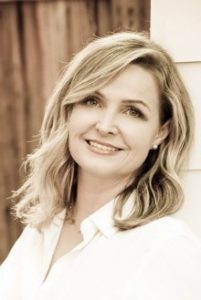Kandy Williams recently sat down with Commie Stevens to ask a few questions about the book Commie co-authored, Your Dollars, Our Sense: A Fun & Simple Guide To Money Matters.
 |
Commie Stevens is a Partner and Managing Director of Strategic and Financial Planning at Beacon Pointe Advisors. Commie designed and oversees the firm’s approach to financial and estate planning. She advises individuals and their families on how best to use their wealth to meet their lifetime and legacy goals. Prior to joining Beacon Pointe Advisors, Commie practiced law as an estate planning attorney at Albrecht and Barney and also served as the Director of Estate Planning for Pacific Life Insurance Company. |
Q: What inspired you and the other “Senses” to write a book about personal finance?
A: Let me start by explaining that The Senses is a group of seven women working at Beacon Pointe who began a weekly email a few years back called “The Sense.” We created that email blast because we were passionate about getting women more educated, empowered, and engaged in their financial lives. While we were having success with pre-retirees and retirees, we were struggling to connect with younger, busy women who didn’t have the time to come to our events. Because all seven of us understood the time constraints of starting a career or balancing the demands of work and family, we realized that it made sense, so to speak, to break down financial knowledge into jargon-free, bite-sized bits. Our short and sweet email blast was our answer, and our book is the culmination of our best advice.
Q: As former practicing attorney turned wealth manager, you must have a good understanding of the financial issues faced by attorneys. What financial advice would you give to an attorney just starting his or her career?
A: Knowledge is power, but you don’t need to know everything about personal finance right away. What you do need to know is what’s important for the next ten years. After deferring earning an income through college and law school, it is certainly tempting to upgrade your lifestyle – better car, better wardrobe, and even small things like a better gym – but all of this adds up. Before deciding how to spend that new paycheck, my best advice is to break up your paycheck into three groups: 50% of your paycheck pays for your needs like rent and groceries, 30% of your paycheck pays for your wants like travel and dining out, and set aside 20% right off the top to a side account to cover financial priorities. Notice that I didn’t say that 20% should be invested. That is intentional because investing comes second to other financial priorities when you’re starting out. Before investing you first need to establish an emergency fund account holding enough cash to cover your necessities for 3-6 months. The unexpected is expected, and without some emergency cash you will just end up taking distributions from your IRA or 401(k) to cover the cost of car repairs, to buy out a lease, or to help meet expenses if you lose your job or need to look for a new job if the one you have just isn’t a fit. Don’t get me wrong, IRAs and 401(k)s are great ways to save for retirement on a tax-advantaged basis, but you need to be sure you can part with those funds for the long term because taking distributions from these accounts before retirement will backfire as they’ll trigger tax penalties.
Once you’ve established an emergency fund, the next priority is to use some or all of that 20% financial priorities account to pay off credit card debt or keep current on student loans. Only after you’ve paid off all credit card debt and paid your student loans do you start saving both for retirement and for any important short-term goals (such as saving for a home down payment or a new car).
Q: You just mentioned that savings can be for both short-term goals and for long-term goals such as retirement. Shouldn’t retirement savings come first?
A: Clearly the more you save early on for retirement, the more you have the magic of compounding on your side. We recommend contributing to your employer-sponsored 401(k) at least enough to get the match, as this is a 100% return on your investment, and will have more time to grow, but when someone has an important concurrent goal such as saving for a home or a wedding, we have to be realistic and recommend splitting that 20% financial priorities account towards these dual goals if needed for a time. The goal though would be to buy a home or save for a wedding that you can afford to allow you to save more for your retirement or financial freedom sooner and to benefit from the power of compounding.
An example we use in our book is what it takes to save a million dollars by age 65. Assuming a 5% rate of return, if you start saving at age 25 you can reach millionaire status by age 65 investing $8,000 per year. However, if you wait until age 35 to invest, for the next 30 years you’ll need to invest significantly more, $14,000 each year to reach that same $1,000,000 goal. Plus, while you may not realize it at the time, you have more discretionary wealth in your 20s than in your 30s when you are more likely to be buying a home and possibly have the cost of raising a family to consider.
Q: Speaking of having a family, what are some tips in your book that apply to attorneys who are ready to start a family?
A: The basic 20% financial priorities rule still applies but by adding a spouse there’s a new dynamic to consider, namely that you and your spouse are likely to have different views on money. Our advice there is to talk about short and long-term money goals often.
If your family will include children, it’s imperative that you use some of your needs fund to make sure you have life insurance, likely the less expensive term insurance variety, to provide for your family in the event you die prematurely. No one wants to think about death and it never seems urgent, but it is vitally important. Getting a basic estate plan in place that includes a will to nominate guardians to care for your children and the funds you leave to them is vital. Whether your suite of documents includes wills or a trust depends on your state of residence but getting a basic plan is a non-negotiable in our minds if you have others that depend on you. No one can replace you, but you can replace the income you would have made and choose in advance who you think will best carry out plans for your family in your absence. It’s the definition of adulting.
Q: In the legal industry, we have seen an increase in people moving from firm to firm or leaving firms altogether to work for themselves or with groups like Montage Legal Group. Given that, do you see personal finance changing for attorneys? Is there anything special that female attorneys should know?
A: Staying with one employer for the long-term is rare. While clearly it’s beneficial to save into your firm-sponsored retirement plans, that may not be enough. Again, aim for 20% of your income to go towards financial security and know that if you go on your own you still have tax-advantaged savings options like a Solo 401(k) or defined benefit plan that might allow you to save significantly more than what you could save in your employer’s 401(k). It may take a while to build your practice should you set out on your own. But, it may be the right choice for you if you’re willing to trade off working a bit longer for more flexibility now that allows you to spend more time with your family while young. Working longer and in different careers is clearly a trend we are seeing with clients that just don’t see the benefit of a traditional retirement.
For women, saving for retirement and financial freedom is even more critical because we live longer, which means more years of expenses to cover later in life. Women also tend to take off more years from their career than men to be caretakers of children, spouses, and other family members. With less years traditionally in the work force and more “retirement” years to cover, a woman’s retirement nest egg must be larger than a man’s nest egg. The best way to make sure you will be covered is to start saving as much as you can as early as you can and get help from a professional to ensure your investments are earning as much as they should be and you are saving enough. If knowing you are likely to need a bigger nest egg isn’t motivation enough for you to make taking charge of your finances a priority right now, just consider that women still face a pay gap in many industries. According to a 2016 report from the Department of Labor, full-time salaried women earn just 82 percent of their male counterparts.
Q: What about attorneys who are mid-career? What should be their financial focus?
A: Once you reach your 40s, it’s time for a financial checkup. Ideally, it’s time to get some professional help from a financial planner with costs on par with those to put an estate plan in place. While just a rough estimate, by age 45 you should have saved about four times your annual income towards retirement. By age 50, you’ll want to have set aside six times your income. This multiple can be shocking but know that if you aren’t on track now there are always solutions to live a sustainable lifestyle. Most people get on track by ramping up their savings in their 50s and 60s. The government helps by allowing you to save more to IRAs, 401(k)s, and other tax-advantaged plans with a “catch-up” provision. Now is also the time to be honest with yourself and your children about what you can afford to provide to them for college and beyond. They can take out loans for college, however, you cannot take out loans for retirement. This is where spending a few thousand dollars to get on track with a financial planner can make quite a difference and the earlier the better. In your 40s it may require a few small tweaks to get on track, yet if you wait until your 60s, you may be looking at more significant lifestyle changes. A good financial planner can help you get organized, help you see what’s possible, and chart a clear path to reaching your best financial life.
Q: You are obviously passionate about getting everyone, but especially women, more involved with their finances. As a mother of a teenage daughter like me, what advice would you give to women about helping the next generation of women be more financially savvy?
A: The other Senses and I are constantly asking ourselves why aren’t more women involved with their finances? It’s not just older women that seem to lack the same knowledge of personal finance as men, but young, professional women too. We can only surmise that it’s our culture. We know we are all a product of our upbringing and most of us still grew up in households where we were told it was not polite to discuss money. But women must discuss money, often and in public. Money is just fuel for your life. You can either take control of your financial future or sit back and let it control you. Our goal in writing the book was to empower women of all ages to take control and design their financial future. We suggest talking to your children at the dinner table about the cost of utilities, avoiding credit card debt, and saving their allowance or birthday money for the computer or cell phone they want. Use those minutes in the car to talk about the stock market. Let them weigh in on the relative costs of your vacation choices. Describe the thought process involved in deciding to follow one career path or another. We must make it just as easy to have opinions about money as we do about our favorite books, sports team or vacation spots.
Q: You have definitely motivated me to take control of my finances and to talk about money with my children, especially my daughter. Thanks for taking the time to talk to us about Your Dollars, Our Sense: A Fun & Simple Guide To Money Matters. If someone wants to sign up for The Sense or buy the book where do they go?
A: To sign up for The Sense weekly email list for free, subscribe here or at GetTheSense.com. The book is available at Amazon.
Kandy Williams

Kandy L. Williams is an experienced corporate attorney who advises founders, startups, and emerging growth companies through all stages and life cycles of their businesses. She has significant experience in mergers and acquisitions and all aspects of private financings, including seed, angel, and venture capital financings.
She has practiced corporate law at several leading law firms with offices in Orange County, including as an affiliated attorney at Bryan Cave LLP, and as an associate attorney at Snell & Wilmer LLP and Brobeck Phleger & Harrison LLP. Kandy opened her own law firm in 2009 and has been affiliated with Montage Legal Group since 2010.
Kandy attended the University of Mississippi and graduated cum laude from Pepperdine University School of Law, where she served as Literary Editor of the Pepperdine Law Review and won several moot court awards and competitions. Kandy previously sat on the Board of Dirctors and was the Chair of the Governance Committee of Hope University, an arts day school for adults with developmental disabilities.

You must be logged in to post a comment.